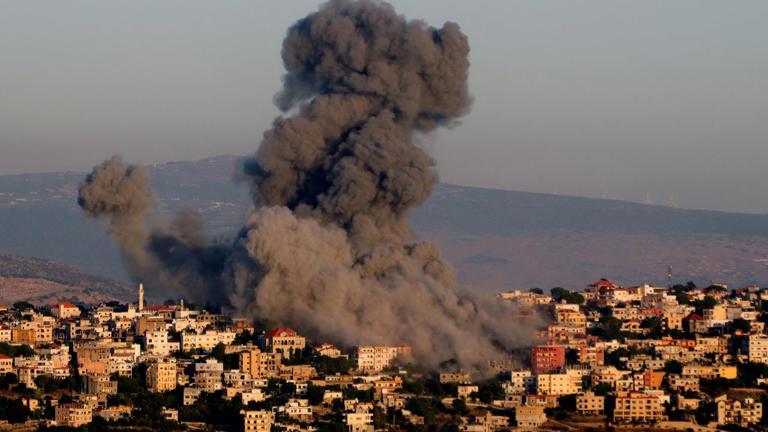
U.S. warned Hezbollah it can’t hold Israel back if escalation continues
During his visit to Beirut last week, President Biden’s envoy Amos Hochstein told Lebanese officials Hezbollah is wrong to think the U.S. would be able to stop Israel from invading Lebanon if the militia continues its attacks, according to a U.S. official, an Israeli official and a Western diplomat briefed on the issue.
Why it matters:
The Biden administration is highly concerned that both Israel and Hezbollah are miscalculating as they escalate their rhetoric and fighting on the ground while thinking they can avoid an all-out war.
U.S. officials are also concerned that without a ceasefire in Gaza, a war between Israel and the Lebanese militant group is becoming more likely, which would dramatically exacerbate the regional crisis and draw the U.S. deeper into the conflict.
Driving the news:
Hochstein traveled to Lebanon last week from Israel after talks with Israeli Prime Minister Benjamin Netanyahu and Minister of Defense Yoav Gallant.
He met in Beirut with Lebanese Speaker of Parliament Nabih Berri, acting Prime Minister Najib Mikati, the commander of the Lebanese military Gen. Joseph Aoun and other officials.
“The situation is serious. What President Biden wants to do is to avoid a further escalation to a greater war,” Hochstein said before leaving Beirut last Tuesday for another meeting with Netanyahu in Jerusalem.
“It will take everyone’s interest in ending this conflict now. And we believe that there is a pathway diplomatically to do it. If the sides agree to it.”
Behind the scenes:
During his meeting with Berri in Beirut, Hochsteim asked the speaker of the Lebanese Parliament to pass a message to Hezbollah’s leader Hassan Nasrallah, that his assumption that the U.S. controls Israel is wrong, the sources said.
According to the sources, Hochstein said the U.S. won’t be able to hold Israel back if the situation on the border continues to escalate and that Hezbollah needs to indirectly negotiate with Israel instead of ratcheting up tensions.
A Western diplomat said that after Hochstein’s visit, Hezbollah sent messages back to the U.S. through third parties saying that while it doesn’t want a war, the group is also confident it can hit Israel significantly if it invades Lebanon.
Two days after Hochstein’s trip to the region, Netanyahu’s top advisers minister Ron Dermer and national security adviser Tzachi Hanegbi came to Washington for meetings at the White House and told Biden’s top aides that the Israeli Prime Minister is not interested in a war with Hezbollah and prefers a diplomatic solution, two U.S. officials said.
A U.S. official said Biden’s advisers told Dermer and Hanegbi they are working on a diplomatic solution, but if there’s a war in Lebanon because Hezbollah decides to attach itself to Hamas’ leader Yahya Sinwar’s interests, the U.S. will fully support Israel.
The White House declined to comment.
State of play:
Israeli and U.S. officials are trying to find an off-ramp that is short of a ceasefire in Gaza — which doesn’t seem to be imminent — but will de-escalate the situation at the Lebanon-Israel border.
One option is to try to use the end of the Israeli military operation in Rafah, which could take place in two weeks and end the high-intensity phase of the war in Gaza, as a point for de-escalation.
At the same time, ending high intensity operations in Gaza would allow the IDF to move forces to the northern border of Israel in case diplomacy fails, Israeli officials say.
Gallant, who is in Washington this week, alluded to those scenarios during a meeting with Hochstein on Sunday.
“Minister Gallant told Hochstein that the transition to ‘Phase C’ in the war in Gaza will impact developments on all fronts, and that Israel is preparing for every scenario both militarily and diplomatically,” the Israeli Ministry of Defense said in a statement.
Source » msn.com





